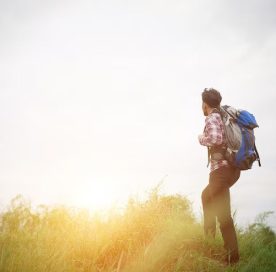Travelling can be an exciting adventure, provided you are particular about travel safety.
Being away from home can put you and your property in a vulnerable position. Frequent travel may increase the risk of identity theft, pickpocketing, and scams. In order to make the most of your excursion, it is crucial to take precautions and stay out of harm’s way.
Proper travel planning can for sure eliminate a lot of these risks. However, there is more to it! Here, we will talk about how you can enjoy a safe trip by taking proper care of your health and belongings. Before that, let’s learn why travel safety and risk management are very crucial.
What Is Travel Safety? Why Is Travel Safety Important?

Travel safety means ensuring good mental and physical health and protection of one’s belongings while travelling.
Travel safety is important as a precautionary measure to avoid the following hazards.
■ Sudden sickness
■ Massive injury
■ Loss or theft of your belongings
■ Attempts of criminal activities
■ Difficulty in returning home (while travelling abroad)
If you are especially travelling with kids, elderly people, or pets, you have to ensure that all safety measures are in place. These groups are more vulnerable to health issues or hazards.
Travel Planning: A Must For Travel Safety

It is normal to be more cautious in unfamiliar surroundings. When planning a vacation, you have to cover the bases to ensure you have a great time while keeping safety a top priority. In preparation for the trip, consider these tips to protect you and your possessions.
Do your Homework
Learn about the area you are exploring. Where do the locals visit? Are there any threats to tourists? Will you need a tour guide at any point? Would a taxi or car service be an appropriate method of transportation?
If it is your first time there, research the specific places you want to visit and prepare accordingly.
Be Mindful Of What You’re Carrying
Whether it’s money, valuables, or medications, be cautious of how much you carry at one time. Back pockets and purses are easy targets for pickpocketing. If you have to carry a bag or backpack, hold it in front instead of behind you.
Use Technology And Travel Gadgets To Your Advantage
Installing tracking applications on your phone or laptop can add an extra layer of security in case they get swiped. Additionally, travel backpacks are specially designed to keep personal belongings safe.
Carrying a lock can also come in handy if you need to step away from the luggage or use a locker.
Locals Are A Great Resource
While concierges and travel agents are experts when it comes to popular tourist spots, who knows the area better than a local? Respectfully approach residents to gain insight into potential dangers and hidden gems.
Don’t Overshare
Give the itinerary and travel plans to family and close friends. When you are in an unfamiliar area, you may not know someone’s true intentions. Even the nicest stranger could have a hidden agenda. Keep important details to yourself and try not to be obvious about being a tourist.
Travel Safety Tips For Your Health

Following a healthy diet and having packaged drinking water are two easy ways to ensure your health safety during travel. However, before you set in, you must follow some special measures.
Here is a quick overview.
Knowing The Local Health Concerns Of The Places You Visit
The location you are about to visit may be prone to specific diseases or infections. There can also be instances of seasonal outbreaks.
Do your research well so that you can avoid travelling in those seasons or take necessary precautions.
Ensure That All Routine Vaccinations Are In Place
Before you book your tickets, check your vaccine sheet and ensure that you are up-to-date with the basic shots like “measles-mumps-rubella” or MMR.
Go For A Medical Checkup Before The Travel
Sometimes, you may need special vaccines or medicines based on your travelling destination. Planning for the trip will anyway start well in advance.
Make sure that you visit your physician and get the necessary vaccination done at least one month prior to your travel date.
Carry Your Medications
Don’t forget to carry a full course of the medication you regularly take for the number of days you will be travelling. Also, keep some basic medicines and a first-aid box handy, as suggested by your physician.
Make Sure That Your Health Insurance Covers Treatment Abroad
If you travel frequently, you must ensure that your health insurance covers treatment abroad. It is crucial to avoid unexpected expenditures if serious health issues occur suddenly.
Travel Safety Guidelines During The Trip
You can be a conscious traveller to avoid infections and sudden health issues during your travel. Here are some easy tips.
■ Choose safe modes of transportation.
■ Wash or sanitize your hands properly.
■ Carry insect-repellent ointments to avoid bug bites.
■ Be respectful around animals, and don’t touch them randomly.
■ Follow safety guidelines during water or outdoor activities.
Final Words
To protect yourself while travelling, check out our infographic & additional travel safety tips for staples.co.uk before, during, and after the trip.
Remember that ensuring your safety or managing risks during travel are essential parts of your travelling activities. Understanding the importance of risk management and safety during travelling, the International Standard Organization has come up with travel risk management guidance for organizations.
You can follow the safety rules discussed while travelling on the road or any other mode of transportation. Or do you think there are some other issues a traveller should keep in mind to ensure their safety?
Don’t forget to share your ideas with us!
Courtesy Of American Car Service
Travel Safety FAQs
You can travel safely by digitizing your essential documents and carrying important documents and devices in RFID-blocking bags/wallets. Remember, many travellers end up losing their documents, creating hassles when returning home.
Further, research well before visiting a place, check your accommodation, and follow a healthy diet to eliminate safety concerns.
Travelling, especially adventure tours, comes with a lot of risks. Often, you are at the mercy of the local climate and geographical typicalness of a place. Further, nature travelling involves exploring dangerous terrains and encountering insects and disease vectors such as mosquitoes, biting flies, etc.
In addition, based on the crime rate of the place you are visiting, there will be risks of theft, robbery, or attacks.
Having a proper travelling plan in place and hiring a known travel management company is crucial to mitigate these risks. Further, if you are travelling solo or only with your family, don’t opt for a remote place unless you are willing to take risks.
Travel safely means that you must be physically and mentally sound while travelling to a new place. Also, you must sportingly adapt to the local amenities available.
You must be alert while travelling, even if it’s a short trip. Further, when the travel plan is a little tough such as you need to go to the mountains or forest, prior preparations and proper arrangements of gear are essential for a safe passage.













